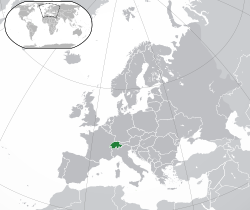ස්විට්සර්ලන්තය
ස්විට්සර්ලන්තය නිළ වශයෙන් ස්විස් රාජ්ය සන්ධානය, එක්සත් සමුහාණ්ඩුවේ ප්රාන්ත 26 කින් යුක්තය. එක්සත් අධිකාරියේ අසුන වන්නේ බර්න්ය. එය බටහිර යුරෝපයේ පිහිටි අතර, මායිම් වන්නේ උතුරින් ජර්මනිය, බටහිරින් ප්රංශය, දකුණින් ඉතාලිය හා ඔස්ට්රියාව, ලිච්ටෙන්ස්ටින් නැගෙනහිරටය. එහි ප්රදේශවන මධ්යම සානුව, ඇල්ෆ්ස් හා ජුරා භූගෝලාත්මකව ස්විට්සර්ලන්තය තුල බෙදී ඇත. එහි වර්ග ප්රමාණය වර්ග කි. මී. 41,225 (වර්ග සැතපුම් 15,940) ක් වේ. එහි ජනගහනය වන මිලියන 7.8[තහවුරු කර නොමැත] සානුව ආශ්රිතව වෙසෙන අතර විශාලතම නගර මෙම සානුව ආශ්රිත වේ. ඒවා අතර ගෝලීය නගර හා ආර්ථික මධ්යස්ථාන වන සුරික් හා ජිනීවා අඩංගුය. ස්විට්සර්ලන්තය ලෝකයේ ධනවත්ම රටක් වන අතර එය ඒක පුද්ගල දළ දේශීය නිෂ්පාදනය වන දළ ජාතික නිෂ්පාදිතය (GDP) ඇ.ඩො. 67,384 කි[තහවුරු කර නොමැත]. සුරික් හා ජිනිවා ජිවන මට්ටම අනුව ලෝකයේ 2 වන හා 3 වන ඉහළම අගය වාර්තා කරයි. ස්විස් රාජ්ය සන්ධානයට මධ්යස්ථ රාජ්යයක් ලෙස දිගු ඉතිහාසයක් ඇත. 1815 සිට එය අන්තර්ජාතික වශයෙන් යුදමය තත්වයකට නොගොස් ඇති අතර එක්සත් ජාතීන්ගේ සංගමයේ සාමාජිකත්වය ලැබු අවසාන රටවල්වලින් එකකි. ස්විට්සර්ලන්තය විදේශීය සංවිධාන බොහෝමයක් තිබෙන අතර ලෝක ආර්ථික සංසදය, අන්තර්ජාතික ඔලිම්පික් කමිටුව, රතු කුරුස සංවිධානය, ලෝක වෙළඳ සංගමය හා එක්සත් ජාතීන්ගේ 2 වන විශාලතම කාර්යාලය වේ. යුරෝපානු මට්ටමින් එය යුරෝපියානු නිදහස් වෙළඳ සංගමය නිර්මාතෘ වන අතර ශෙන්ගන් සම්මුතියේ කොටස්කරුවෙකි. එහි ජර්මන්, ප්රංශ හා ඉතාලි යන ප්රධාන භාෂා හා සංස්කෘතිකමය ප්රදේශ 3 කින් සමන්විත වේ. එබැවින් එය ස්වදේශීය හා භාෂාමය අවශ්යතාවයකින් යුත් රාජ්යයක් නොවන්නේය. ස්විස් රාජ්ය සන්ධානය ආරම්භය චාරිත්රානුකූලව 1291 වර්ෂයේ අගෝස්තු 01 දා දක්වා දිව යයි.
ස්විස් රාජ්ය සන්ධානය | |
|---|---|
උද්යෝග පාඨය: (traditional) "Unus pro omnibus, omnes pro uno" (ලතින්) "One for all, all for one" ("එක සැමටත් සැම එකාටත්") | |
 Location of Switzerland (green) in Europe (green & dark grey) | |
| අගනුවර | None (de jure) බර්න් (de facto)[note 1][1] |
| විශාලතම නගරය | සූරීච් |
| නිල භාෂා(ව) | German; French; Italian; Romansh |
| ජාති නාම(ය) | Swiss |
| රජය | Federal multi-party directorial republic with thorough elements of direct democracy |
| Corina Casanova | |
| ව්යවස්ථාදායකය | Federal Assembly |
| Council of States | |
| National Council | |
| History | |
| c. 1300[note 2] celebrated on 1 August 1291 | |
| 22 September 1499 | |
| 24 October 1648 | |
| 7 August 1815 | |
| 12 September 1848[2] | |
| වර්ග ප්රමාණය | |
• සම්පූර්ණ | 41,285 km2 (15,940 sq mi) (135th) |
• ජලය (%) | 4.2 |
| ජනගහණය | |
• September 2019 ඇස්තමේන්තුව | 8,570,146[3] (96th) |
• 2013 ජන සංගණනය | 8,002,345[4] |
• ඝණත්වය | 198/km2 (512.8/sq mi) (65th) |
| දදේනි (ක්රශසා) | 2015 ඇස්තමේන්තුව |
• සම්පූර්ණ | $480.938 billion[5] (39th) |
• ඒක පුද්ගල | $58,731[5] (9th) |
| දදේනි (නාමික) | 2015 ඇස්තමේන්තුව |
• සම්පූර්ණ | $688.434 billion[5] (19th) |
• ඒක පුද්ගල | $84,070[5] (2nd) |
| ගිනි (2013) | 33.7[6] මධ්යම |
| මාසද (2013) | ඉතා ඉහළ · 3rd |
| ව්යවහාර මුදල | Swiss franc (CHF) |
| වේලා කලාපය | UTC+1 (CET) |
• ගිම්හාන (DST) | UTC+2 (CEST) |
| දින ආකෘති | dd.mm.yyyy (AD) |
| රිය ධාවන මං තීරුව | right |
| ඇමතුම් කේතය | +41 |
| Patron saint | St Nicholas of Flüe |
| ISO 3166 code | CH |
| අන්තර්ජාල TLD | .ch |
වෙබ් අඩවිය http://www.admin.ch | |
මූලාශ්ර
සංස්කරණය- ^ Holenstein, André (2012). "Die Hauptstadt existiert nicht" (PDF). http://www.kommunikation.unibe.ch (scientific article). UniPress (German බසින්) (UniPress 152: Die Hauptstatdtregion). Berne: University of Berne: 16–19. සම්ප්රවේශය 27 March 2014.
Als 1848 ein politisch-administratives Zentrum für den neuen Bundesstaat zu bestimmen war, verzichteten die Verfassungsväter darauf, eine Hauptstadt der Schweiz zu bezeichnen und formulierten stattdessen in Artikel 108: «Alles, was sich auf den Sitz der Bundesbehörden bezieht, ist Gegenstand der Bundesgesetzgebung.» Die Bundesstadt ist also nicht mehr und nicht weniger als der Sitz der Bundesbehörden.
{{cite journal}}: External link in|website= - ^ A solemn declaration of the Tagsatzung declared the Federal Constitution adopted on 12 September 1848. A resolution of the Tagsatzung of 14 September 1848 specified that the powers of the institutions provided for by the 1815 Federal Treaty would expire at the time of the constitution of the Federal Council, which took place on 16 November 1848.
- ^ "Recent monthly and quarterly figures: provisional data". Population and Households Statistics (STATPOP) (official website). Neuchâtel, Switzerland: Swiss Federal Statistical Office, Swiss Confederation. සම්ප්රවේශය 24 March 2015.
- ^ "Population – Key figures: Main indicators" (official website). Neuchâtel, Switzerland: Swiss Federal Statistical Office, Swiss Confederation. සම්ප්රවේශය 24 March 2015.
- ^ a b c d "Switzerland". International Monetary Fund. සම්ප්රවේශය 2 November 2014.
- ^ "Gini coefficient of equivalised disposable income (source: SILC)". Eurostat Data Explorer. සම්ප්රවේශය 13 August 2013.
- ^ "2014 Human Development Report" (PDF). 14 March 2013. pp. 21–25. සම්ප්රවේශය 27 July 2014.
සටහන්
සංස්කරණය- ^ De jure "federal city"; de facto capital. Due to historical federalist sensibilities, Swiss law does not designate a formal capital; and some federal institutions such as courts are located in other cities.
- ^ The traditional date of the Rütlischwur was 1307 (reported by Aegidius Tschudi in the 16th century). The date of the Federal Charter of 1291 was selected in 1891 for the official celebration of the "Confederacy's 600th anniversary".

